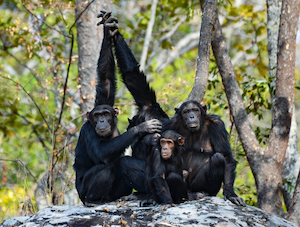Support Anthropogeny Field Courses
Click the button below to begin your 100% tax-deductible donation. Please specify in the notes that your support is for field courses:
Read CARTA's Field Course Report Explore the Field Course Map
Out of CARTA's uniquely transdisciplinary discussions has emerged a one-of-a-kind graduate specialization in Anthropogeny. The most highly anticipated part of the track for many students (and professors) is the transformational field course entitled, "Perspectives on the Human Phenomenon" (Anthropogeny Field Course, ANTH 289S). Set in multiple sites, the course gives our Anthropogeny graduate students experience examining well-known fossil and archeological evidence (e.g. "Lucy," etc.), comparing human anatomy and behavior with other non-human primates in the ecological context of East Africa, and participating in the everyday lives and activities of modern foragers living in environments similar to those in which we all first evolved.
There may be an opportunity for some higher-level donors to join us on the course once it is deemed safe for both travelers and local communities.*
Some of our other exciting destinations include:
- Archaeological Site of Atapuerca World Heritage Site & Museo de la Evolución Humana, Burgos, Spain
- National Museum of Ethiopia, Addis Ababa, Ethiopia (Behind the scenes tour in Archaeology & Palaeoanthropology departments)
- Ngorongoro Crater (Sleep on rim and game drive)
- Ndutu Lake, South Serengeti, Tanzania (Game drive)
- Olduvai Gorge, Tanzania (Site and Museum)
- Visit to Yaeda Valley
- Lake Tanganyika (Ngombe or Mahalle with forest chimpanzees and then the Ugalla River National Park, Tanzania, with savanna chimpanzees)
* Limited availability. Going on the three-week course requires the ability to travel on long intercontinental flights, long off-road drives in rough conditions and sometimes rigorous travel on foot in steep terrain in tropical climates. Some other terms & conditions may apply.
For more information or to discuss other ways you can join in our journey of discovery, please contact Jesse Robie at (858) 246-0846 or jrobie@health.ucsd.edu.


